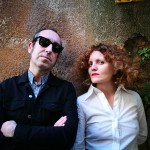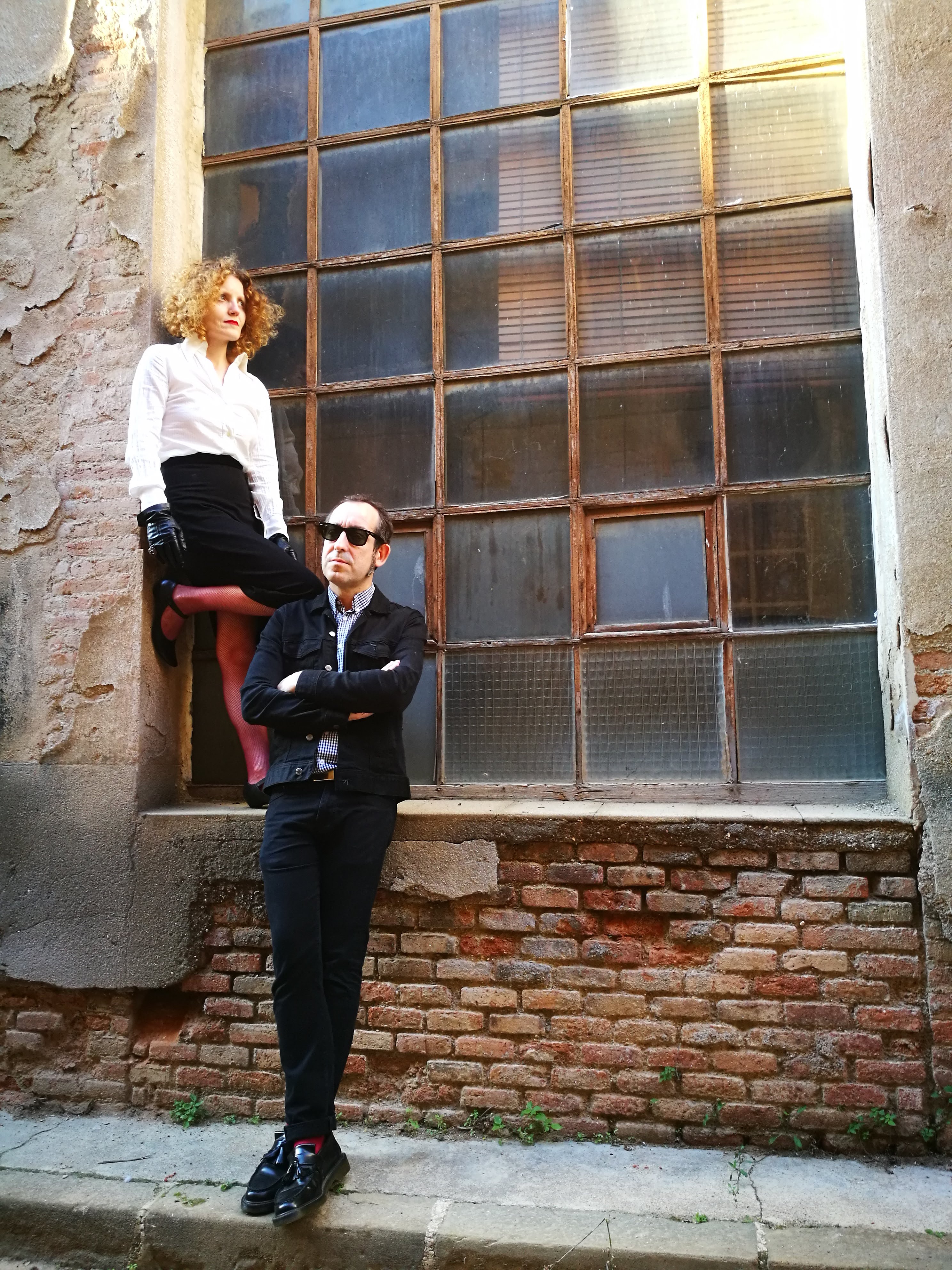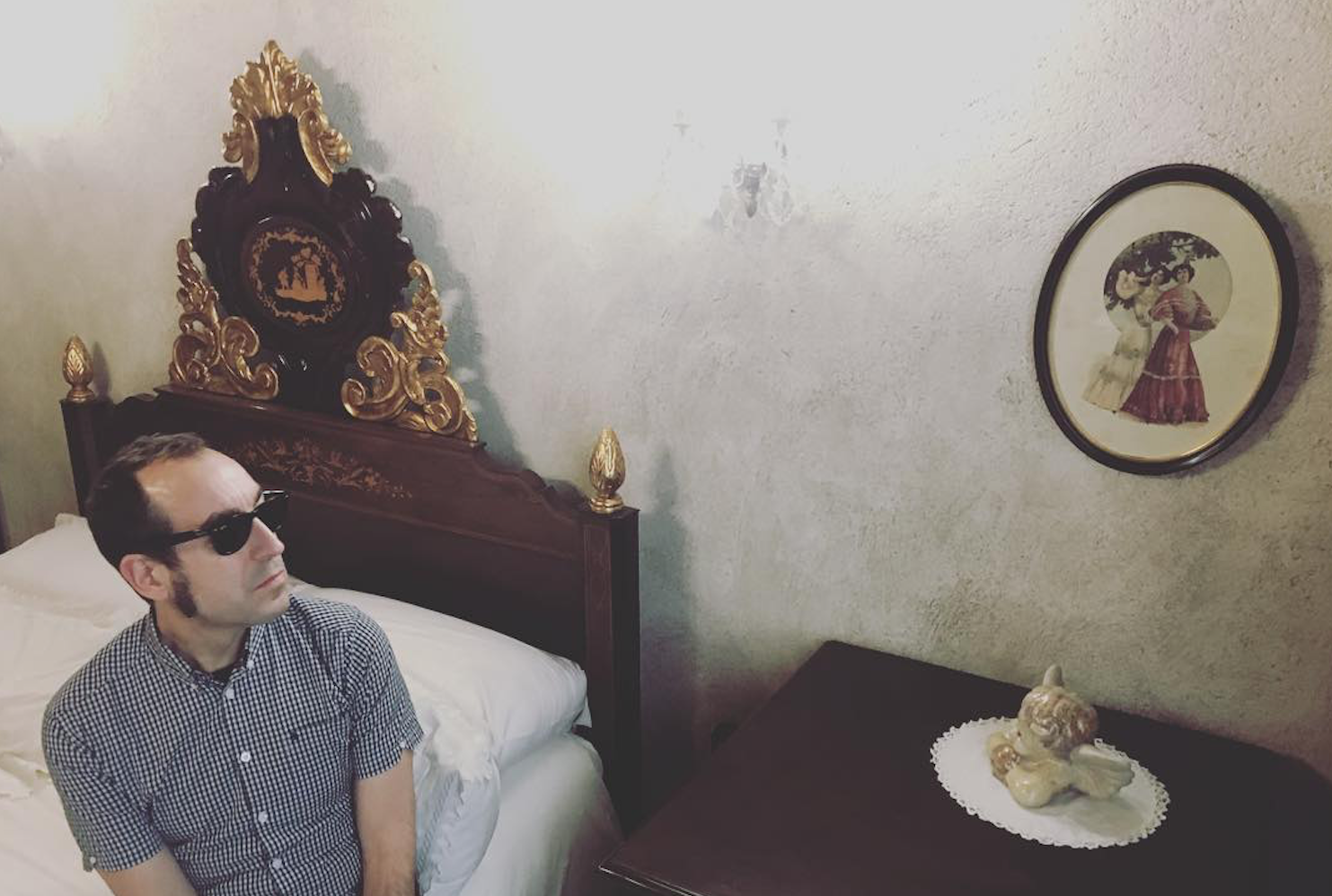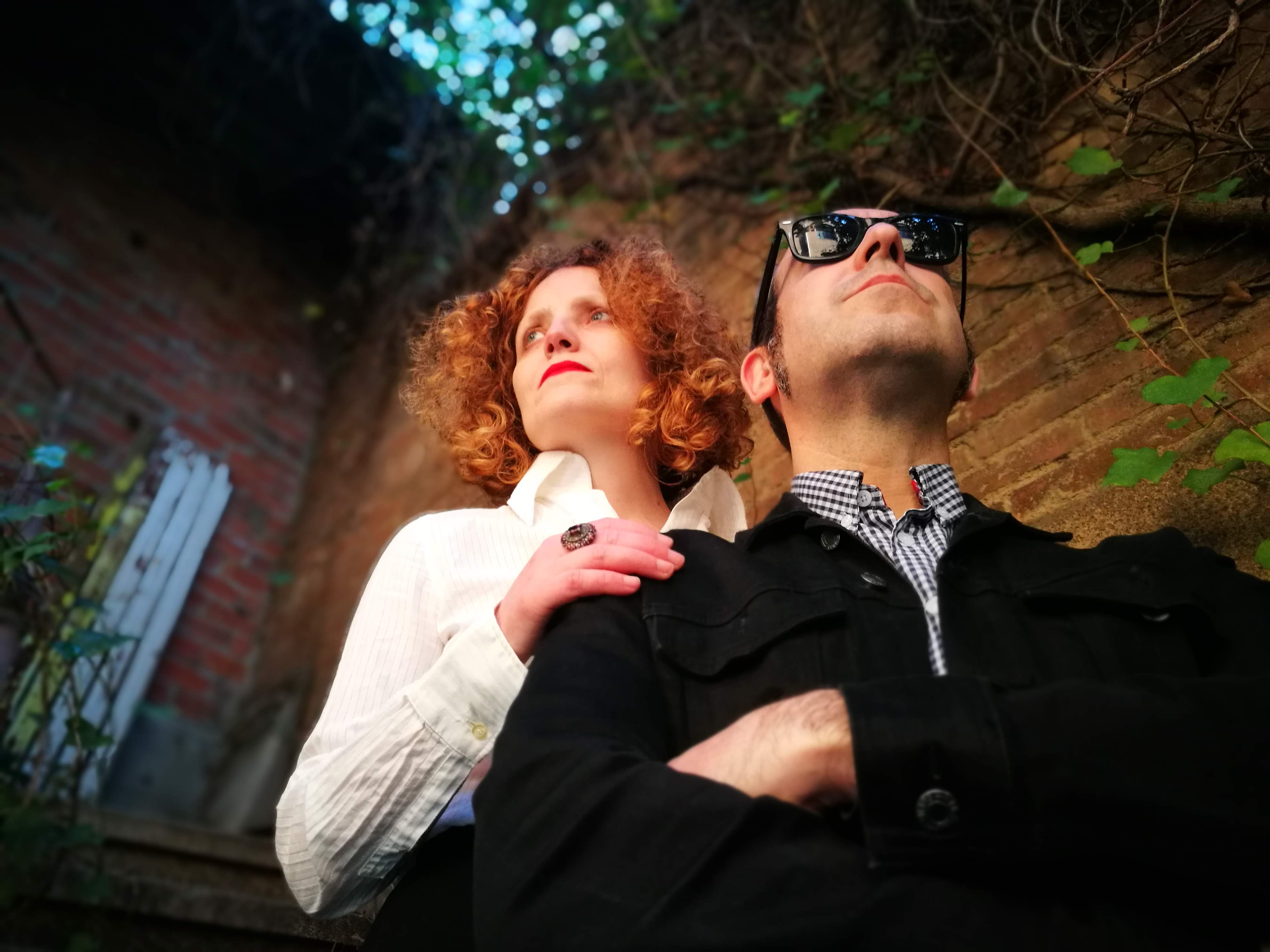 When Raúl López launched his project Comando Suzie some fifteen years ago, he probably had no idea that he was anticipating a musical retro trend, because in the mid-90s the hip glossy magazines were still pushing post-rock and student folk as the post-modern avant-garde of the hour. Years later, when Boy Hasher and an array of other new wave influenced pop groups haunted the realm of music, the Catalan project has long since cast a style like this in an unconventional form with Spanish vocals and touchingly beautiful melodies. Not only his distinctive lyrics, which earned him the reputation of a “Mediterranean Crooner”, make him stand out from the mass of similarly working musicians. López brought with him many years of experience as a musician and singer in Barcelona’s gothic and post-punk underground and still embodies the more poppy side of that indefinable local music culture in which names like O Paradis, Escama Serrada, Circe and Coagul pop up and which has already attracted a number of foreigners like Novy Svet and Niedowierzanie. The experimental aura of this neighbourhood is also subliminally tangible in Comando Suzie, and in some songs it suddenly comes to the surface, as well as a well-dosed ambiguous humour that can be noticed even without knowledge of Spanish. We talked with Rául about his new album “Corazón o Plomo”, about backgrounds and new line-ups, his work with partner Eva and the sensitivity it takes to create music like Comando Suzie. Curtain up for one of the most promising insider tips of dark electronic pop music.
When Raúl López launched his project Comando Suzie some fifteen years ago, he probably had no idea that he was anticipating a musical retro trend, because in the mid-90s the hip glossy magazines were still pushing post-rock and student folk as the post-modern avant-garde of the hour. Years later, when Boy Hasher and an array of other new wave influenced pop groups haunted the realm of music, the Catalan project has long since cast a style like this in an unconventional form with Spanish vocals and touchingly beautiful melodies. Not only his distinctive lyrics, which earned him the reputation of a “Mediterranean Crooner”, make him stand out from the mass of similarly working musicians. López brought with him many years of experience as a musician and singer in Barcelona’s gothic and post-punk underground and still embodies the more poppy side of that indefinable local music culture in which names like O Paradis, Escama Serrada, Circe and Coagul pop up and which has already attracted a number of foreigners like Novy Svet and Niedowierzanie. The experimental aura of this neighbourhood is also subliminally tangible in Comando Suzie, and in some songs it suddenly comes to the surface, as well as a well-dosed ambiguous humour that can be noticed even without knowledge of Spanish. We talked with Rául about his new album “Corazón o Plomo”, about backgrounds and new line-ups, his work with partner Eva and the sensitivity it takes to create music like Comando Suzie. Curtain up for one of the most promising insider tips of dark electronic pop music.
As I heard, your forthcoming album will be released soon. Are you still working on it or is it already finished? How happy are you with the result?
It’s been a year now since the album was finished, actually…! But due to the pandemic, a change of record label and other matters the release was delayed. Now it’s about to see the light, hopefully. I believe the album contains some of the best songs I’ve ever written, and some arrangements and details that give a different feel to it.
The title will be “Corazón o Plomo”, which means “Heart or Lead”. It’s an interesting phrase, and in our language, lead often stands for a bullet, or for something heavy. Is there a story behind it?
Some time before beginning to write the songs I watched a Spanish TV series called “Narcos”, in which Pablo Escobar said over and over “Plata o plomo”, meaning something menacing like “Give me the money or you’ll get a bullet”. For some reason, that reminded me of a song by a Spanish band called Astrud where the chorus are: “I’m telling you to love me (or you have to love)!”, in a kind of menacing, desperate way. There’s some of that despair in the album, like in a classic drama film, and I thought the title “Corazón o plomo” somehow fitted, because it’s hard and tender at the same time, bitter and sweet…just like life is, and love.
When you compare it to “Principios Y Salidas”, do you see a continuation or more the beginning of something new?
“Principios Y Salidas” was more simple about lyrics, music and production. It was meant to sound deliberately retro and only one of the songs is about love and relationships. “Corazón o Plomo” is somehow a continuation of the second album, “El hombre sentimental”, although there’s an evolution as for arrangements and production. PYS was entirely composed and arranged by me, while in “Corazón o Plomo” one can clearly notice the hand of Eva Grace and Demian Recio.
It will be the first full-length release with Eva Grace a.k.a. Gracia Auguri as a band member, but you already played together live and participated on the “Nuova Guardia”-Compilation. How would you describe the chemistry of your duo cooperation? Du you write the songs together?
Comando Suzie has always been my own personal projet. Since the beginning, back in 2006, lots of people have come and gone in the band, but both music and lyrics are made by me, and I’m the one who has the last word (I’m such a tyrant with that). Of course, most of the musicians and producers that have collaborated with me have brought good ideas to the project (or at least have tried to).
Eva Grace is a great singer and she is brilliant on stage, but I just cannot share the writing of the songs of Comando Suzie with anyone. It’s just too personal…but Eva usually gives ideas like: “you should add some strings here”, “that sound is too low”, “let me record a harmonica”, and she is mostly right.
We have plans to make a different project together, one in which I’m not a dictator, haha.
Eva played music before, so for instance in a cabaret group. What would you say is her biggest contribution to Comando Suzie?
Eva sang and played bass in some bands in the past, and has been an actress in theater and cabaret. She also plays guitar and has such an impressive music culture. She’s such a brilliant personality and has a really mighty image on stage. She adds the female side I’ve always wanted to be present in Comando Suzie, especially in the live acts.
There are some further participants like your friend Demian of O Paradis. What can you tell us about the work on the album?
Demian helped me with the recording of the first album of the Comando, back in 2006. Aside from our great friendship, Ô Paradis is no doubt one of my favorite artists, and I knew from the beginning I wanted to work with him in “Corazón o Plomo”, thus, as soon as I finished the demos, I sent them to him and gave him total freedom to add any arrangements or changing whatever he wanted to. In the end, some of the songs stayed virtually the same I had planned in my mind, but others were touched by Demian’s magic, becoming something totally different from the usual sound of the Comando, which I really appreciate.
There is also a special collaboration of Aloma Ruiz Boada (Current 93) playing violin in one of the songs.
You have Santi Capote playing guitar, quite a new name over here. He also made a fizzy remix of the song for Bandcamp, and I think you remixed his music too. What can you tell us about him? Will you cooperate more in the future?
Santi Capote was part of a duo from Madrid called Ellos (Them) that became pretty famous from the late 90’s until they split off in 2015. I was always a huge fan of the band, and when Santi moved in to Barcelona, I got to meet him. Apart from being a brilliant guitar player and composer, he owns a mastering studio, and so I asked him to master Principios y Salidas. A couple of years later, I decided to leave Barcelona and moved in to Terrassa, and curiously enough, I found out that Santi has done the same. Since we’re living 10 minutes from each other, I thought it’d be a fantastic idea to have him as collaborator in the mix and master of Corazón o Plomo. He recorded some synths and guitars during the process, and there’s were the idea of the remix came up. Of course, I’d love to collaborate with him again in future works.
Let’s talk a bit about the prehistory of Comando, as you have played in other bands already in the 90s. Who were these groups, and how did they sound?
Well, what I recall is having been in bands and play music ever since my father bought me a synth, back in 1989, so I’ve been in quite a lot of bands since then. Some of them were electronic music bands, and others were Gothic Rock and Darkwave. The first “serious” band I was involved with playing keyboards was a Gothic Rock and Post Punk band called Messiah Of Pain. There’s were I began writing songs. They had a very Christian Death, Sisters Of Mercy and Fields of the Nephilim style. Anyway, soon after that, the guy who played guitar and I started our own project called Rememberance combining electronics and guitars in the way of some bands in Germany such as Girls Under Glass (whom we were the support band in their gig in Barcelona), The Eternal Afflict, The Fair Sex, The Invincible Spirit, and also non German like The Cassandra Complex.
In fact, we ended up signing a contract with a German label called Sound of Delight and got to record in a “real” studio. We actually had a lot of success among the Gothic scene and Darkwave at the time.
How did you got interested in Wave, Post Punk or Synthie music in that days? Was there a bigger music community of that sort in Barcelona?
I guess it all started like with many other people: one day you listen to Depeche Mode and The Cure on the radio, and your life changes. Then you discover that in the 80’s there was a bunch of marvelous bands in Spain, such as La Mode, Aviador Dro, Los Pegamoides or Parálisis Permanente. After that, a class mate hands you a tape with The Sisters Of Mercy and Front 242, takes you to some dark club in the city, and from that moment you get involved in the goth scene, discover more and more bands and get to know a lot of people, since there were only a few clubs in Barcelona and everyone knew each other. It was actually in the late 80’s and early 90’s when I started to get interested in the Darkwave. That was a time of transition where the biggest dark and New Romantic bands, the clubs and the fashion were in decadence. The clubs were still playing music by bands like Front 242, Virgin Prunes, Sex Gang Children, Borghesia, Pankow, à,GRUMH or The invincible Spirit, but at same time, in Germany new bands were appearing that totally fascinated me. I’m talking about all that explosion of electo-gothic bands like Project Pitchfork, Deine Lakaien, Das Ich, In Strict Confidence, The Fair Sex, Dance or Die, etc.
When was Comando Suzie actually born? Was it mainly your brainchild, or more a band thing in the beginning?
In spite of having played keyboards and composed for a long time, I had never sung before. The thing started all of a sudden, back in 2006, after going to a life-changing concert of a local band called Tarántula. I was a bit bored with the dark scene, and with music in general, and that concert meant to me something like the fascination I felt with the German bands in the early 90’s, or even more intense than that. And almost by accident, kind of as a joke, I decided to write a song about every member of Tarántula, and I uploaded them all in MySpace so that my friends could have a laugh. Soon after that I was contacted by the Italian label Punch Records, with Tairy inviting me to record a CD and join the first festival organized by the label in Leipzig, along with bands like Novy Svet, Ait!, Ô Paradis, Wermut, Thomas Nöla, Mushroom Patience…
Comando Suzie has been, from the beginning, a very personal project, a way for me to express myself, never afraid of people’s opinions.
I love the name Comando Suzie with its ambiguous connection between the harsh and the sweet, and the fact that all this stays rather unclear. I know that it’s considered cool to be secretive about a band name, but is there an idea behind it?
OK, I’m going to tell you about how absurd it was the choosing of that name. Novy Svet were living near Barcelona at that time, and on the weekends we used to have dinner together with Jurgen, Frl. Tost, Demian of Ô Paradis and Sergio of Escama Serrada in a pizza restaurant close to my place. Novy Svet had a side project called Unidad Sasao, so after some bottles of Lambrusco I came up with the idea that if I ever had a band, I’d call it something similar, like Comando Sasao, or Comando Susi (Susanna was the name of my partner at that time). Then Frl. Tost suggested that it would sound much better in German, “Suzie”. And that’s the story behind the name…
For me, there is always something hypnotic in your music, which is combined with a serene melancholy. Would you say that this is an attitude to life which is familiar to you?
I’m such a melancholic person that I try to avoid it in order not to fall into a deep well that I couldn’t escape from. I only open that door when I write songs, and then I close it at once.
Despite your use of repetition and sometimes simple patterns, I never regard your music minimalistic. Maybe it’s the emotional side that makes it appear vital and opulent. How do you think about it?
I love simple patterns in music. As a matter of fact, I like simplicity in general, and have always believed that less in more. For instance, I really like hip hop drums, and also minimalist electronica rhythms. I guess the contrast between those cold and simple beats and my style of singing, so passionate and wordly, and the lyrics, which are closer to those of a classic songwriter are the things that make Comando Suzie different from a typical minimal electro band.
When it comes to the initial ideas for new songs, do they usually come when you’re playing with your equipment, or do they rather appear suddenly?
I usually compose while playing keyboards with a piano sound, searching for the structure of the song playing with chords, but sometimes I get a song from a rhythm pattern, or a synthesizer sound. Mostly, I first make the music, and later add lyrics, but also there’re times when both lyrics and music come up to my mind suddenly while riding my motorbike, and then I have to rush to the studio as soon I as get home.
The participants in CS have always changed over the years, still there is a continuing element or kind of a signature that stays. What is for you the red thread that leads through all the activities of your band?
As I said, every person that’s ever been in the studio or live with the Comando has contributed with some ideas. There’s only one thing I’d never accept, and is any suggestions or asking for any changes in my lyrics.
When you look at your backcatalogue, is there one album which you see as your most quintessential one?
My favorite one is the second album, “El Hombre Sentimental”, because it’s the most personal of all (aside the new album) rearding the things I explain in the lyrics, and it’s the perfect mixture of electronics and more kind of organic sounds.
Some of the new pieces are already out on Bandcamp and Youtube, so the song “Espigón”. The lyrics, like in the earlier song “Fotos”, refer to something like love in the age of digital media, and to me it almost appeared like a slice from an Eric Rohmer style movie. Do you see yourself as a storyteller?
Absolutely. What I’ve been doing from the first album is telling stories about things that happen around me, about my friends, acquaintances, society… I really enjoy condensing a story which makes more or less sense in 3 or 4 minutes. Of course I also get a great deal of ideas from things I see or read in the social media.
In the video and the title, places seem to play a role, and the zoom carries the viewer through the whole scenery. Do you refer to places connected to your own biography?
When I was living in Barcelona I used to love spending time on the beach and walk trough the breakwaters. That’s the only thing I sometimes miss from the city. Part of the video was recorded during the confinement, back in March, that’s why the beach looks deserted and kind of phantasmagoric, and the rest are older images I had on my phone.
By the way, which is the place with the high rise buildings at the beginning of the clip? I almost felt like in a Jess Franco film…
Those buildings are located in an area called Diagonal Mar, next to the beach and the Parc del Fòrum, where the Primavera Sound festival takes place. I like those buildings because there’s something unsettling about them, but at the same time one feels attracted by them and just can’t stop staring at them.
“Nubecita y Tormenta” means “Cloud and Storm” and deals with a topic that Coagul also has referred to: The fast shifts and changes that a city like Barcelona is undergoing these days. In the lyrics you hear about the inner city disctricts Gracia and Poble Sec. What inspired you to this song?
It’s a kind of night tour through Barcelona, with its endless nights full of clubs, music, faces and all kind of excess, and like other songs in the album, it’s somehow a way to say goodbye to a city I have lived in its highest intensity, and a place where I’ve experienced so many adventures and misadventures that left me emotionally worn out.
You moved to the neighbouring town of Terrassa north of Barcelona, Eva’s birthplace. Was this a spontaneous decision, and does the new place influences your songwriting?
Both Eva and I found ourselves facing a similar moment in our lives. We felt our lives in the big city had come to an end, and so we decided to move in to Terrassa, where we have a more quiet life, a slower rhythm. Terrassa is much smaller, with less cultural events, no tourists, no hipsters, no experimental music clubs…it feels a bit as if living in a village and this is something that has an influence when it comes to writing songs. Maybe the next lyrics will be a bit different, a bit more introspective, who knows?
Two years ago you participated on the mentioned Compilation “La Nuova Guardia” alongside Coagul, Escama Serrada and O Paradis. Was it mainly a celebration of your friendships, or also some sort of a hommage to Catalan underground?
Both, even if we’re musically different, there’s something common that unite all four bands, and it’s that Mediterranean Pop-Folk-Industrial spirit which seed was planted by Novy Svet in the times they were living in L’Ametlla del Vallès.
Your interpretation of the children song “Como la Luna” is quite exceptional for CS, as it’s rather experimental, and for me it fit quite well to the troubled situation in your place at that time. What’s the song about?
Well, it was Eva’s idea to make a cover of that children’s song, and all the arrangements in the song are made by her, so that’s the reason it has a different sound from the usual Comando songs, since she wanted to try something more experimental. It’s a song we used to sing when we were kids, and we remembered it talked about being as tall as the moon, but were totally surprised when we discovered that the lyrics talk about about soldiers coming from fighting in Catalonia. So yes, it somehow has to do with the political situation, and curiously enough, we added some words backwards of the Spanish president at the time speaking about Catalan people, and only a few days later he resigned. So, we laughed a lot thinking that maybe we had created some kind of magic spell unconsciously.
These days one should be careful with future plans and wishes, but of cause we all have some. Are there already plans for Comando Suzie in 2021?
I stopped making plans in the long term some years ago, and now, even more. I’m merely hoping to get my hands on the new vinyl and get to make some gigs the way they used to be, with people smiling with no masks.
(Interview: U.S., Translation U.S. und N. Seckel)
Fotos: Mònica de Miguel and Eva Grace
